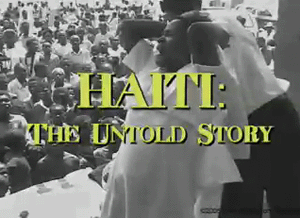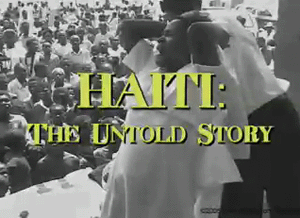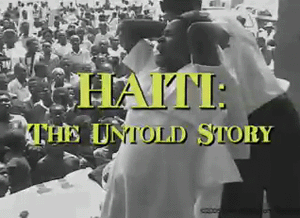A cross-Canada week of action in solidarity with Haiti will be kicked off by a November 12 demonstration on Parliament Hill in Ottawa. Solidarity committees are springing up across the country, objecting to the central role that the Canadian government played, along with France and the United States, in overturning the democratically-elected government of Haiti.
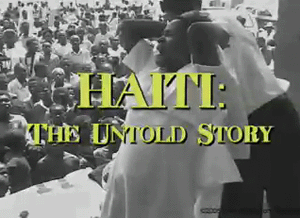 In October, Kevin Pina completed a cross-Canada tour, screening his new film Haiti: The Untold Story in cities and towns across the country, from Halifax to Victoria. Pina, based in Port-au-Prince, is an independent journalist with the Haiti Information Project (HIP), a correspondent with Flashpoints Radio, and a documentary filmmaker. In September, he and Jean Ristil, another Haitian journalist, were jailed for several days for attempting to film the Haitian National Police entering the residence of Father Jean Juste, a prominent political prisoner jailed by the de facto regime installed after the 2004 coup against Jean-Bertrand Aristide.
In October, Kevin Pina completed a cross-Canada tour, screening his new film Haiti: The Untold Story in cities and towns across the country, from Halifax to Victoria. Pina, based in Port-au-Prince, is an independent journalist with the Haiti Information Project (HIP), a correspondent with Flashpoints Radio, and a documentary filmmaker. In September, he and Jean Ristil, another Haitian journalist, were jailed for several days for attempting to film the Haitian National Police entering the residence of Father Jean Juste, a prominent political prisoner jailed by the de facto regime installed after the 2004 coup against Jean-Bertrand Aristide.
Pina also toured Canada in February of this year, screening his earlier film Harvest of Hope and his work-in-progress Haiti: The Betrayal of Democracy. Derrick O’Keefe caught up with Kevin Pina during his stop in Vancouver, where 150 people attended the premiere of his latest film.
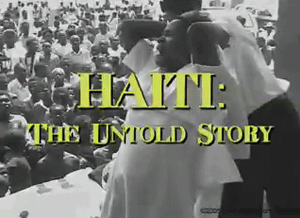
|
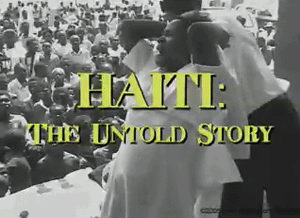
|
Derrick O’Keefe: You have just been from one end of Canada to the other, screening your film Haiti: The Untold Story. What was your impression of people’s awareness of what is happening in Haiti, compared to what you found on your previous visit in February?
Kevin Pina: I think that Canadians are beginning to see more clearly that their government has been involved in covering up human rights violations in Haiti. In February, we had a great response to the tour of my rough cut for the upcoming film Haiti: The Betrayal of Democracy. And with this new film, Haiti: The Untold Story, there has been a tremendous response. There have been a lot of new faces. Everyone has commented on all the new stops about how many new faces have come to see this film, people who have not been involved in Haiti solidarity networks.
I think that since I was here last February, there has been an increased militarization of Canada. We know that they’ve doubled the military budget. We know that they’ve increased the standing army from 60 thousand to 90 thousand. We know that they are planning on increasing the number of Canadian troops in Afghanistan. So, it’s in this context that we’re showing this film about Haiti. And Haiti was the first opportunity for people to really begin to see that Canada is beginning to play a different role in the world. That, now, there’s very little differentiation between Canadian foreign policy and U.S. foreign policy, or less and less differentiation. And Haiti was really the first example of that, preceding this new period of militarization.
O’Keefe: At the beginning of your film, there is a warning about the very graphic footage of suffering and death. Why did you feel it necessary to include this footage?
Pina: Well, it was a difficult choice. I want to be respectful of the dead and the dying, because there are many people that you see dying in this film as well. But I also realized that many of these people would remain faceless and nameless except for their inclusion in this documentary film. And so it was not out of disrespect, or lack of dignity, that I included them. It was actually the opposite. It was out of respect for them, so that people could understand that these were living, breathing human beings, who would otherwise have died without anyone knowing that they had ever existed.
O’Keefe: Many of the massacres documented since the coup have been carried out by the Haitian National Police (HNP). What has been the role of the Royal Canadian Mounted Police (RCMP) in working with the HNP?
Pina: We know that the RCMP has been involved in Haiti for over a year now. We know that Canadian Special Forces were involved in securing the airport when Jean-Bertrand Aristide was forcibly removed from the country by U.S. military forces on February 29, 2004. The RCMP and the Paul Martin administration have patted themselves on the back and have made statements saying that they are proud of the role that they have played in rebuilding the Haitian National Police. Yet, during the same period, the Haitian National Police have gone into poor neighborhoods and have committed massacres, have summarily executed arrestees in their custody. And at the same time during this period, the Haitian National Police have shot at unarmed demonstrators. We saw that on February 28th, to the point where even the United Nations had to make a statement that they would no longer allow the police to shoot at unarmed demonstrators. Yet it happened a second time, on April 27th, and the Haitian police went even further. They then attempted to plant guns on the corpses of their victims, to justify having killed them.
Within the Haitian National Police, there is no Internal Affairs division that investigates crimes or human rights violations committed by the police. For example, there have been Canadians in the RCMP who have brought to my attention that every professional police force in the world has a firearms discharge review committee. The role of this committee is that whenever a police officer fires his gun, there is an immediate investigation to understand the circumstances of the incident. That does not exist in Haiti, and the RCMP knows it does not exist in Haiti today. So there is no system of accountability. Many of the police officers in Haiti are using illegal arms. Most of their firearms are not even registered by a central office within their own force. The RCMP knows this full well.
So Paul Martin and the United Nations pat themselves on the back, and the RCMP receive a peace award from the United Nations for their role in training the Haitian police. And yet when the Haitian police have been involved in massacres, have been involved in shooting unarmed demonstrations, those same people, Paul Martin and the United Nations, wash their hands of any responsibility or culpability. So they want it both ways. On one hand, they want to pat themselves on the back by saying we’re “restoring democracy to Haiti” by training the police, but when the police are responsible for committing gross human rights violations, their wash their hands of any culpability. It’s duplicitous.
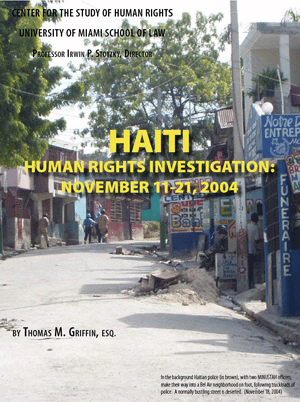 O’Keefe: Pierre Pettigrew, Canada’s Foreign Minister, has dismissed last year’s Thomas Griffin report on the deplorable human rights situation in Haiti as “propaganda.” Anyone who has actually read this report should be very moved and shocked by the graphic photos and descriptions of massacres and systemic human rights violations. Is it true that the situation in Haiti has gotten even worse since Griffin’s delegation visited in November 2004?
O’Keefe: Pierre Pettigrew, Canada’s Foreign Minister, has dismissed last year’s Thomas Griffin report on the deplorable human rights situation in Haiti as “propaganda.” Anyone who has actually read this report should be very moved and shocked by the graphic photos and descriptions of massacres and systemic human rights violations. Is it true that the situation in Haiti has gotten even worse since Griffin’s delegation visited in November 2004?
Pina: Absolutely, the human rights situation has gotten worse since Tom Griffin’s report.
Canadian government officials are fronting for Canadian foreign policy in order to cover up complicity in human rights violations in Haiti. How else can you explain Paul Martin saying that there are no political prisoners in Haiti? Paul Martin made that statement. Say that to Father Gerard Jean Juste, who is wasting away in a small jail cell knowing that he is innocent. This is a man who has been deemed a prisoner of conscience by Amnesty International. This is a Catholic priest who is being persecuted because of his affiliation and leadership within the Lavalas Party. Tell that to So Anne, Annette Auguste, the folk singer who has been held in jail since May 10, 2004. Tell that to Prime Minister Yvon Neptune, and countless others who are being held in jails throughout Haiti for no other reason than their political affiliation and their political sympathies with the Lavalas Party.
This is a cover-up. And Paul Martin knows it. But they have, at this point, expended so much political capital and reputation marching in lock step with U.S. foreign policy that for them to reverse their position and acknowledge the reality would affect them at the polls.
O’Keefe: Those who have engineered this regime change in Haiti are now seeking to legitimize it with elections. In addition to jailing many of the leading figures of the Lavalas Party, how will the coup supporters ensure the results they want, given that, as you and others have argued, the Lavalas Party is still the most popular political party, especially among the poor majority of the country?
Pina: Well, first of all, this vote has been paved with the blood of thousands upon thousands of Haitians, who have been killed, summarily executed, attacked during peaceful demonstrations, or dragged out in the middle of the night and shot. On top of that, you have thousands more who are in internal exile, or in external exile. So Lavalas was the target of this iron fist that had no other goal but to destroy it so that it could not participate in the upcoming elections. The leadership is jailed, in exile, or killed. How on earth can that party be expected to participate fairly in those elections, given what has happened since February 29, 2004?
On top of that, these upcoming elections have been fixed. They’ve been rigged so that they disenfranchise the majority of the population, the 70 percent peasants who live in the countryside who are the very base of support — along with urban slum dwellers — of Lavalas. There were 12,000 polling stations in November 2000. That has been reduced to 600 to 800 in these upcoming elections. Let’s give them the benefit of the doubt and say 800 polling stations. We’ve taken a map and we have gotten early reports of where those polling stations will be located. We estimate that the average peasant in the countryside will have to get up very early in the morning, walk five hours to a polling station, spend one to two hours in line, and then walk five hours back home, losing a day of toiling in the fields and feeding his family. We don’t see that they are going to do that. This is a way of disenfranchising the majority of the population. The fix is in by virtue of the way in which the polling has been structured.
O’Keefe: We hear very little, here in Canada at least, about what Aristide is saying from his exile in South Africa. What is his role today, and is there a future for Aristide as a political factor in Haiti?
Pina: Aristide himself has said he does not want to return before the elections. Aristide just recently released a statement, through his spokesperson Maryse Narcisse, from South Africa that these are not going to be free and fair elections. He refers to them as a “selection,” meaning of course that no one will be elected without the approval of the United States Embassy.
The future for Aristide is intimately intertwined with the future of Lavalas, which right now is a party that they have attempted to destroy. It is an idea that the majority of the poor who live in abject poverty have the right to have a voice in the national affairs of Haiti, have a right to universal literacy programs, have a right that is equal to the small, traditional, economic elite that the United States, France, and Canada have shown they are more than comfortable working with yet again. That is who these elections are for. The biggest indicator of that was a statement by the Haitian ambassador to Canada, Robert Tippenhauer, who just last week said that humane capitalism is the only solution to the woes of Haiti.
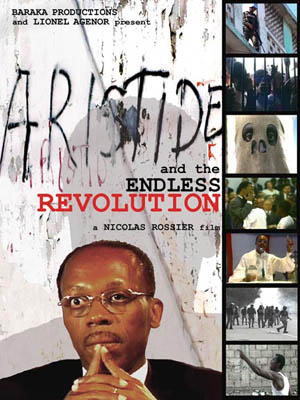 My response to Mr. Tippenhauer is: When, in the entire history of Haiti have the traditional reactionary elites, who control the economic monopolies of that country, ever been humane? They have always protected their monopolies through violence, whether that be supporting coups or whether that be supporting paramilitaries to keep down and eliminate the demands for justice and for equality in Haiti.
My response to Mr. Tippenhauer is: When, in the entire history of Haiti have the traditional reactionary elites, who control the economic monopolies of that country, ever been humane? They have always protected their monopolies through violence, whether that be supporting coups or whether that be supporting paramilitaries to keep down and eliminate the demands for justice and for equality in Haiti.
For more information on the week of Haiti solidarity action in Canada, go to <http://www.canadahaitiaction.ca>. See, also, Nicolas Rossier’s new documentary Aristide and the Endless Revolution.
 Derrick O’Keefe is an anti-war activist and co-editor of Seven Oaks, an on-line journal of politics, culture and resistance.
Derrick O’Keefe is an anti-war activist and co-editor of Seven Oaks, an on-line journal of politics, culture and resistance.

